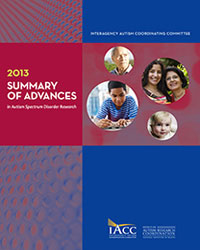Summary of Advances
In Autism Spectrum Disorder Research
2013
Optimal outcome in individuals with a history of autism - Fein D, Barton M, Eigsti I-M, Kelley E, Naigles L, Schultz RT, Stevens M, Helt M, Orinstein A, Rosenthal M, Troyb E, Tyson K. J Child Psychol Psychiatry. 2013 Feb;54(2):195–205. [PMID: 23320807]
ASD is generally considered to be a lifelong condition. However, recent research demonstrates that some people who have been accurately diagnosed with the disorder as children will subsequently go on to lose their symptoms and hence their ASD diagnosis as they grow up, eventually functioning socially on par with their typically developing peers. There have been previous reports of this nature, but concerns about whether the individuals had been diagnosed correctly initially, and whether they had indeed fully recovered, have remained. This case-control study documented 34 children between the ages of 7 and 21, who experienced what this research group termed an 'optimal outcome' (OO). Researchers compared the children's previous and current functioning to that of 34 age-, sex-, and nonverbal IQ-matched typically developing children, and 44 children with 'high-functioning' ASD. After independently verifying that the ASD diagnosis of all children was correct, standard cognitive and observational tests and parent questionnaires were conducted. The OO children performed similarly to typically developing children on measures of socialization, communication, face recognition, and language. This suggests that their ASD symptoms really had improved to the point that their ASD diagnosis had been appropriately dropped. To better understand how this group differs from others with ASD, the researchers used patient histories, including previous test scores and clinical descriptions, to examine the early childhoods of the OO children, comparing their behavior to that of children with 'high-functioning' ASD. Upon examination, researchers found that earlier on in life, OO children generally had milder social deficits and slightly higher IQs compared to those with 'high-functioning' ASD, but had equally severe difficulties with communication and repetitive behaviors. Although it is possible that deficits in more subtle aspects of social interaction or cognition still remain in these individuals, the results do substantiate reports of individuals who were correctly diagnosed with ASD as young children, but who no longer meet the criteria for ASD. With this result confirmed, the researchers are now investigating brain function in OO children and determining whether they have subtle residual social deficits. They are also reviewing records on the types of interventions the children received, in order to learn to what extent interventions may have played a role in the transition from ASD to optimal outcome.
The cost-effectiveness of supported employment for adults with autism in the United Kingdom - Mavranezouli I, Megnin-Viggars O, Cheema N, Howlin P, Baron-Cohen S, Pilling S. Autism Int J Res Pract. 2013 Oct. [Epub ahead of print] [PMID: 24126866]
Unemployment is high among adults with ASD—only 15% are employed in full-time paid jobs, and such jobs are typically poorly paid. Therefore, adults with disabilities, such as those with ASD, often enroll in supported employment programs, which provide assistance in finding and retaining jobs. These employment programs introduce job seekers to competitive programs offering individualized placements as well as continued support throughout employment. While these supported employment programs have been found to result in greater individual satisfaction, greater financial gains, and more independent living, such programs are also costly— particularly for the publicly funded National Health Service (NHS) in the United Kingdom (UK). Investigators in this study therefore sought to evaluate the cost-effectiveness of supported employment programs for a sample of 50 adults with ASD in the UK. Supported employment for adults in this study (30 participants) was administered by support workers whose duties include the assessment of clients' level of functioning, job finding, work preparation, and ensuring that clients can cope with the social and occupational requirements of the job. Individuals in the comparison group (20 participants) all had access to employment advice from Disability Employment Advisors (DEAs, who aided individuals with disabilities seek work, acquire new skills, and conducted employment assessments to identify suitable jobs), but did not have full-time guidance from a supported employment worker. Participants in the supported employment group all received a formal diagnosis of autism or Asperger syndrome and had an IQ of at least 70. The control group included individuals with ASD who were matched in intellectual and linguistic abilities. All participants in the study were actively seeking work in the UK, had no additional psychiatric or physical problems that adversely affected employability and none lived in areas of high unemployment.
Researchers examined the impact of supported employment programs on two outcomes: total number of weeks in employment and quality-adjusted life year (QALY; a measure of burden on an individual's life in terms of quality and quantity). Researchers determined that supported employment produces improved outcomes compared to that of standard care services (standard care costs for the control group were estimated via the cost of day services). These benefits were observed to cost an additional £18 ($30) per week of employment or £5,600 ($9,330) per quality-adjusted life year. These figures are well below thresholds that define maximum spending per QALY, as set by the UK's National Institute for Health and Care Excellence (NICE) clinical guidelines. In addition, results indicated that supported employment programs were more cost-effective relative to standard care services. Though supported employment programs are initially more expensive than standard services, researchers declare that these costs decrease over time as individuals gain independence. Moreover, investigators of this study suggest that the cost of supported employment programs is outweighed by the significant benefits in employment and quality of life for adults with ASD—outcomes that can also lead to the overall reduction in economic burden to a nation's health and social services spending.




